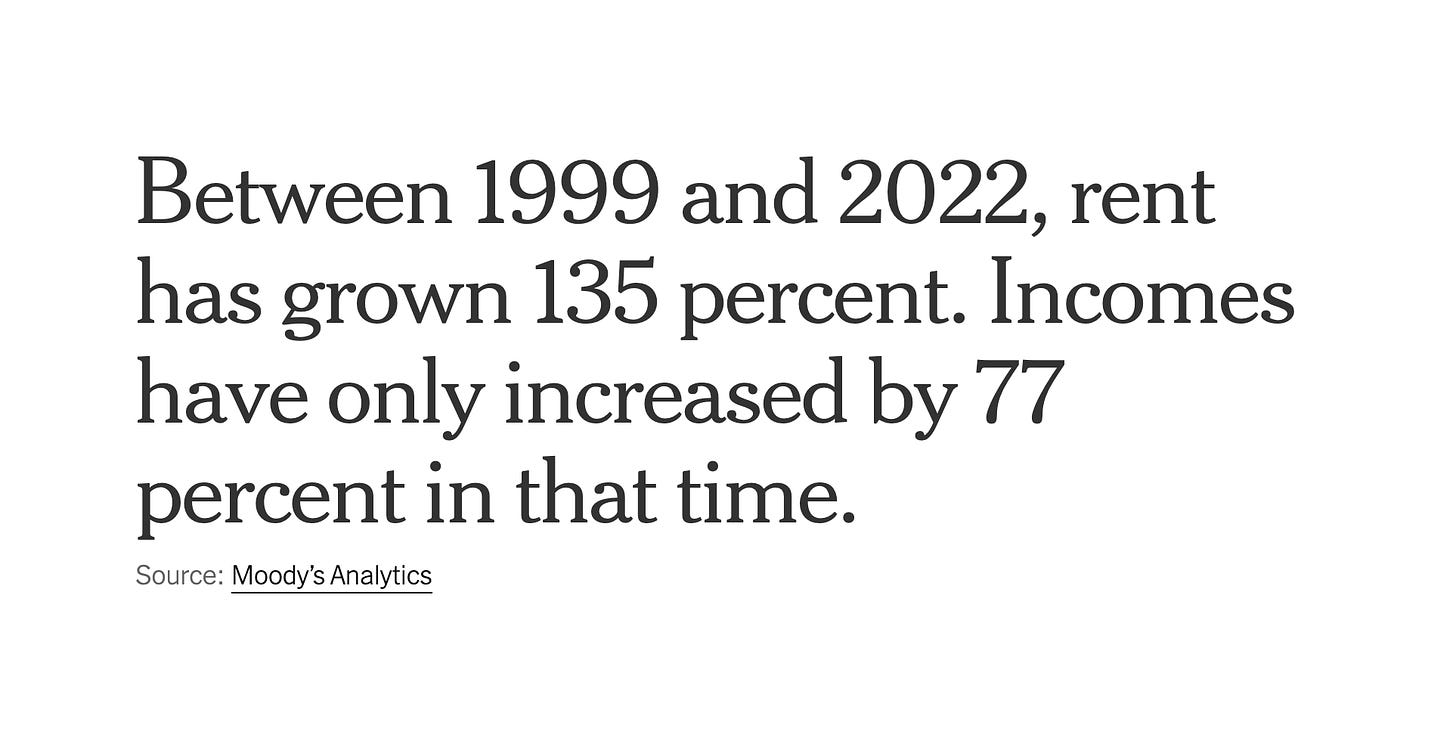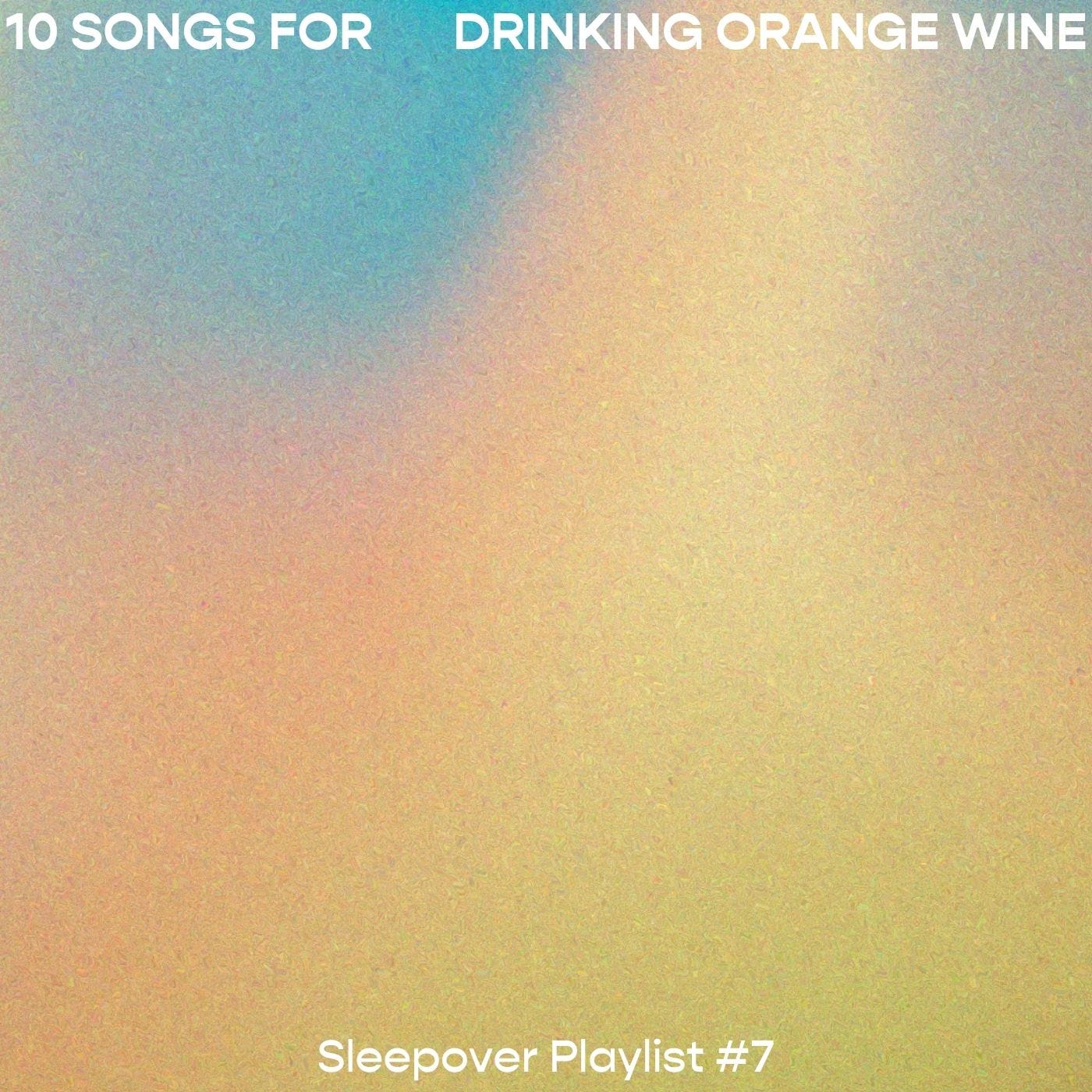Having a Kid? In This Economy!?
What about a commune instead — I mean, community.
Hello capybaras! Thanks for reading Sleepover. In the spirit of accessibility, this newsletter will always be offered for free. Please consider a paid subscription if you’d like to support the things I create — with and beyond this project.
Considering I still indulge in habits that are infantile in nature (warm milk, an army of plushies, breakfast for dinner, the constant desire to be cradled), I shudder at the sight of newborn babies, not because they are objectively ugly, but because raising a child of my own is a forlorn thought, one I swat to the ground faster than the mosquitoes that attempt to invade my apartment at dusk. According to the Brookings Institute, as of 2015, it will cost the average family in the United States over $300,000 to raise a child up to the age of seventeen, which does not account for the astronomical costs of higher education, nor last year’s inflation rate of 8.6%.
In a world where paying rent as a young professional is increasingly difficult, the opportunity cost of having children is astronomically higher than it was fifty years ago — not to mention the debate over the ethics of pro-creating in a warming climate. And yet, when I consider what my parents mean to me, I understand the allure of raising a family, and why many choose to become a parent. Growing up, I viewed upbringing as a part of life one ought to graduate from in order to succeed. I dreamt of independence in the form of adventures abroad, a home free of clutter, and days filled with the social melodies of urban life. As I grew older, however, the foundations upon which I was raised became one of my largest sources of gratitude. The small or big ways in which our families support us become key pillars from which we continue to grow. And, if we are lucky, we become friends with our parents — genetic, chosen, or both — and blossom beyond the bud of a familial relationship.
We look at them and think: They raised me. We wonder what we would do if we had children at this moment in our lives, and upon the desperate image of ourselves wrapping a baby in toilet paper and attempting to donate it to Goodwill, our appreciation multiplies. We see beyond the words “mom” and “dad,” and reach the people who have been weaving their own narrative tapestries, rich in color with certain dreams, frayed at the ends with others, far before we started to exist. And the closer we look, we begin to see that the stitches changed patterns, several times over, to protect the hopes of not one person, but many.
Though wanting to bear children is a desire I do not share, it is a desire I understand. While organizations like Stop Having Kids argue that having children is the highest act of self-obsession, in that a person chooses to bring someone into the world without their consent, based on their own desires and dispositions, I would also argue that many people choose to bring someone into the world in the pursuit of selflessness, aspiring towards a phase of life where they are caring for another, giving in totality, as opposed to operating a life that orbits solely around themselves. For many, establishing purpose in a world filled with existential doubt is an ongoing struggle, and self-directed pleasures can be insufficient tools. It makes sense that many people choose to give in the form of a family, for we are happier when we give to others.
While I find no internal conflict when it comes to deciding between spending $300,000 on myself (hotels, sushi, building new projects) or another person (diapers, daycare, educational institutions that are, in many ways, broken), I agree that sharing is core to a happy life. One winter break during university, I binge-watched five seasons of Parenthood, obsessed with the idea of belonging to a large family, in which conflict and support collided with one another like strains of wool in the blankets that kept me warm. Eighteen year old me would have told you that I wanted at least three kids. Holidays filled with children and grandchildren were a part of my dream.
Eighteen year old me, however, would have also told you that I wanted a wife, a dog, and an executive role at a management firm. 🤢 Coming into my queerness helped me see beyond the recipe of living I’d been taught was “right” ever since I was little: do well in school, get a good job, make a lot of money, get married, buy a house in the U.S., and have a family — then you’ll be happy. At a certain age, or a certain point in our development, many of us realize that we do not have to do anything. Children are a choice, and an expensive, time-consuming, personally sacrificial one at that.
Today, I view family beyond the box it is so often described in, and consider the root of what we mean when we say the word. Watching Parenthood when I was younger bore the fertile desire for the same joy and interpersonal commitment I saw on screen, but at this stage in my life, I realize that family exists in many forms, and the reason it gives us purpose is the same reason we gather at coffee shops, go out with friends, or call our besties from college. For many of us, our family becomes our community, with whom we share, and to whom we give. When we replace the concept of family with community, possibilities open up like the afternoon sun.
The queer community is no stranger to the practice of building a chosen family. Whether out of necessity or desire, it is important for marginalized communities to carve out our own spaces in society, to find a sense of home amidst the people who understand us. Although an alternative to the nuclear family floats by me in the form of co-parenting, in which I can imagine myself raising children with the economic and emotional support of several parents (say ten, instead of two), what comes first is a life focused on community in place of children.
I want to cultivate a love, and a home, that allows the traditional border of what we consider family, and whom we are willing to spend our time, energy, and money on, to ease, lengthen, and reach those outside of our own blood: our friends, our neighbors, and people without the resources to posit, let alone pursue, their own dreams. I imagine channeling the incomprehensible gratitude I have for my parents back to them, not in the form of grandchildren, but in the form of a vacation to Europe (don’t quote me on that). And, if I am being brutally honest, I imagine a bottle of orange wine, slightly effervescent, tart, and funky like a mango, exchanged for the unbearable pitch of a baby bawling over its inability to comprehend that the loud noise from outside was not a personal assault.
Capy Corner: The Xanax of News 🙂
For once, some good news — helping us be a little less stressy and depressy! Here’s a roundup of some wins in cultural diversity and representation for queer, BIPOC+, and womxn-identifying communities around the globe:
Chinese women are defying ‘Beauty Duty’ with buzz-cuts and bare faces - ny times
Legend Zhu, a former model, posted a selfie on a Chinese social media platform, Xiaohongshu, showcasing her buzz-cut hair and makeup-free face, challenging the traditional beauty norms in China. While many applauded her defiance, she also faced backlash, exemplifying the delicate nature of feminist statements in the country. Nonetheless, this incident is part of a growing trend among young Chinese women rejecting the societal expectations of beauty and appearance, opting instead to focus on personal development and individuality.
Edward James Olmos is teaching young Latinos how to succeed in Hollywood — and life - la times
Edward James Olmos founded the Latino Film Institute, a nonprofit that champions the richness of Latino lives, aiming to integrate the community into the entertainment industry. Central to the Institute's efforts is the Youth Cinema Project (YCP), which emerged from the Los Angeles Latino International Film Festival, another initiative co-founded by Olmos. YCP provides students with a comprehensive education in film-making, from conceptualizing to post-production, with many of its graduates proceeding to further studies and careers in cinema, helping to address the long-standing underrepresentation of Latinos in the film and TV industry.
Remembering the first National Coming Out Day 35 years ago, that took on Reagan and AIDS stigma - washington post
In 1988, amidst the AIDS crisis, the first National Coming Out Day (NCOD) was initiated, encouraging people to publicly proclaim their LGBTQ+ identities, hoping that increased visibility would bring more attention to the AIDS epidemic which the government largely ignored. The date, October 11, was chosen as it marked the anniversary of the Second Gay and Lesbian March on Washington in 1987, which demanded action on AIDS. While NCOD is now a global event, activists emphasize remembering its political roots and the importance of physical presence and activism, especially as LGBTQ+ rights continue to face challenges.
Tribal leaders and researchers have mapped the ancient “lost suburbs” of Los Angeles - la times
The Whittier Narrows Natural Area in Los Angeles is rich with history, formerly known as Shevaanga, an important location for the Gabrieleño-Kizh tribe. A new project titled “Mapping Los Angeles Landscape History” aims to spotlight hundreds of such significant sites, detailing prehistoric human interactions with nature, created by an alliance of tribes, scholars, and students. The larger historical context reveals how Indigenous populations thrived in these areas until they faced oppression, first from Spanish settlers and later from the American government, with present-day efforts seeking federal recognition for the land and its historical significance.
Playlist of the Week: 10 Songs for Drinking Orange Wine 🎛️
This week’s playlist features the multicultural dance duo DRAMA (based in Chicago), the Afro-Latina dj-producer twins coco & breezy (based in New York), and Nigerian-German producer and DJ IAMNOBODI (based in Berlin).
Thanks for reading the Sleepover newsletter!
Your feedback is always appreciated. Reply to this email or comment on the Substack post to let me know what you liked, what you didn’t like, and what you want to see more of.
With love,
Your favorite capybara ~ AKA Travis Zane
Follow me on: Instagram 🪩 TikTok 🪩 Twitter 🪩 YouTube 🪩 Twitch 🪩 Website
Follow Sleepover on: YouTube 🪩 Instagram 🪩 TikTok 🪩 Twitter
Sleepover is a party that turns into a sleepover, a newsletter publishing cozy content to your inbox every week, and an occasional mixed media series promoting BIPOC+, queer, and womxn-identifying creators — produced online and in print.







